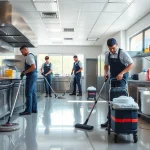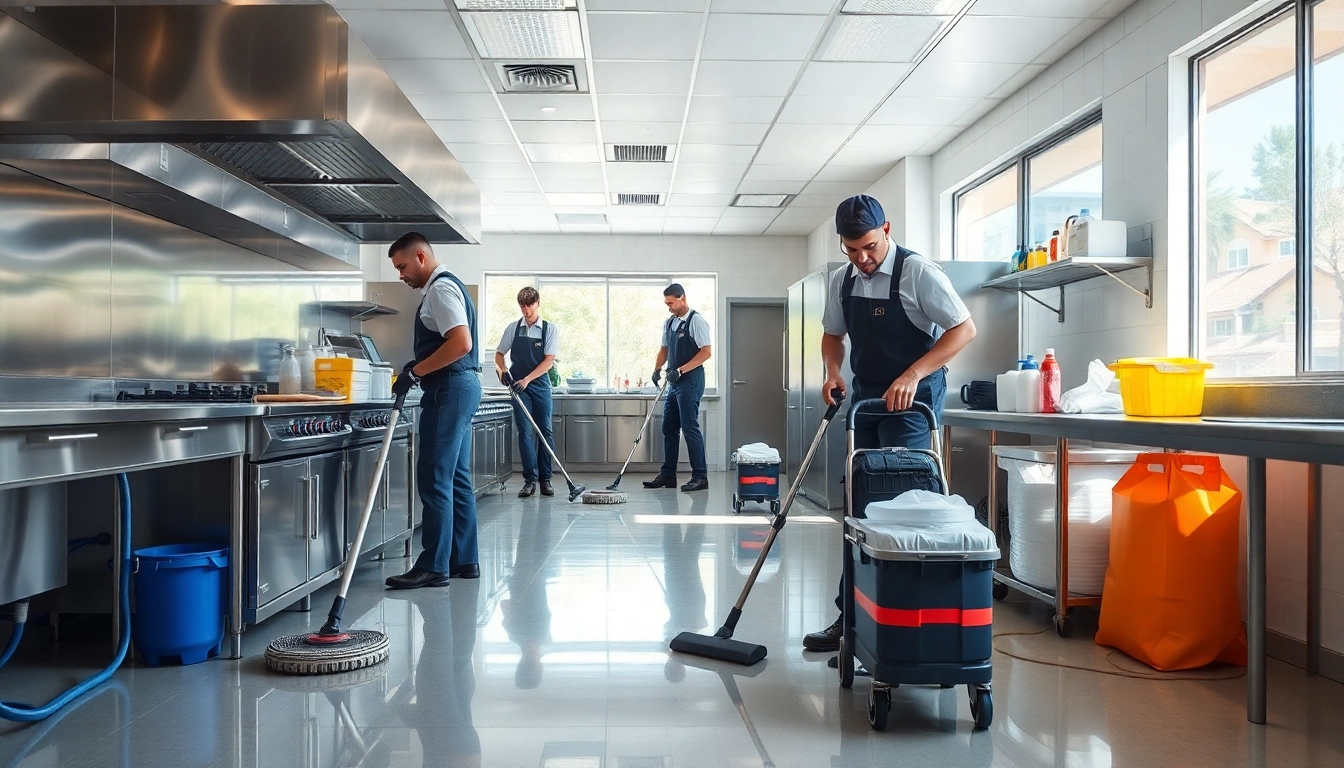Understanding the Importance of Restaurant Janitorial Cleaning Service
What is a Restaurant Janitorial Cleaning Service?
A Restaurant Janitorial Cleaning Service refers to a specialized cleaning solution designed to maintain hygiene standards in restaurants and eateries. These services encompass a range of cleaning tasks, from routine cleaning of dining areas and kitchens to deep cleaning efforts that ensure all areas are sanitized and presentable. This service is crucial not only for aesthetic purposes but also for complying with health regulations and ensuring the safety of both staff and patrons.
The Impact of Cleanliness on Customer Experience
The cleanliness of a restaurant significantly influences the customer experience. When patrons enter a clean and well-maintained establishment, it fosters a sense of trust and comfort. According to numerous studies, diners are likely to return to restaurants that showcase cleanliness and hygiene. A dirty or poorly maintained restaurant can lead to negative reviews, loss of customers, and even health violations that could jeopardize a business’s reputation. Investing in a reliable Restaurant Janitorial Cleaning service is an investment in the overall customer experience.
Key Standards for Restaurant Hygiene
To meet the high standards of restaurant hygiene, businesses must adhere to specific protocols that safeguard food safety and customer health. Key standards include:
- Regular Cleaning Protocols: Establishing daily, weekly, and monthly cleaning schedules to ensure all areas are consistently maintained.
- Surface Sanitization: Utilizing appropriate sanitizers for food contact surfaces to eliminate harmful bacteria.
- Restroom Cleanliness: Ensuring that restrooms are cleaned and stocked regularly, as this reflects the establishment’s overall hygiene.
- Pest Control Measures: Implementing strategies to prevent pest infestations is crucial for maintaining a clean environment.
- Employee Hygiene Training: Ensuring staff members are trained in personal grooming and hygiene protocols.
Essential Components of a Restaurant Janitorial Cleaning Service
Common Cleaning Tools and Equipment Used
A comprehensive restaurant janitorial cleaning service requires an array of tools and equipment that enhance cleaning efficiency. Commonly used items include:
- Floor Scrubber Machines: Ideal for maintaining the cleanliness of various types of flooring.
- Vacuum Cleaners: Essential for keeping dining and kitchen areas free from debris and dust.
- Microfiber Cloths: Excellent for dusting and wiping down surfaces without leaving lint or streaks.
- Industrial Cleaning Solutions: These are formulated to tackle tough grease and grime found in restaurant kitchens.
- Personal Protective Equipment (PPE): Ensures safety for cleaning staff, including gloves, masks, and eyewear.
Best Practices for Staff Training and Management
Effective cleaning in restaurants relies significantly on the training of staff. Key best practices include:
- Regular Training Sessions: Conduct training that instructs staff on proper cleaning techniques and the importance of hygiene.
- Clear Cleaning Protocol Guides: Providing easily accessible guides outlining cleaning procedures can enhance understanding and compliance.
- Onboarding Procedures: Implement comprehensive onboarding for new employees to instill hygiene as a core value of the establishment.
- Performance Reviews: Regular evaluations of staff cleaning performance can encourage accountability and improvement.
Health Regulations and Compliance Guidelines
Restaurants must navigate various health regulations to operate legally. Some essential compliance guidelines to be aware of include:
- Food Safety Regulations: Adhering to local and federal food safety laws is non-negotiable.
- Health Inspections: Regular inspections by health authorities require that cleanliness standards are upheld at all times.
- Record Keeping: Maintaining detailed cleaning logs for inspections can demonstrate compliance and commitment to hygiene.
How to Choose the Right Restaurant Janitorial Cleaning Service
Factors to Consider When Evaluating Services
Selecting the right restaurant janitorial cleaning service involves evaluating several factors, including:
- Experience and Specialization: Look for service providers that specialize in restaurant cleaning and have a proven track record.
- Service Offerings: Ensure that the service covers all necessary cleaning areas—from dining rooms to kitchens—and can customize services to fit specific needs.
- Reputation: Research service reviews and testimonials from other restaurant owners to gauge reliability and quality.
- Insurance and Credentials: Confirm that the service has the appropriate insurance and licenses to operate safely and legally.
Questions to Ask Potential Service Providers
When vetting potential janitorial services, consider asking the following questions:
- What cleaning products do you use? Are they environmentally friendly?
- Can you provide references from other restaurants you serve?
- How do you train your employees in cleaning protocols?
- What procedures do you follow in the event of an incident such as a health inspection failure?
- How do you handle scheduling and unexpected cleaning emergencies?
Comparing Services and Pricing Models
Understanding the pricing models of janitorial services is vital for budget management. Common models include:
- Flat Rate Pricing: A fixed amount that covers all services, making budgeting straightforward.
- Hourly Rates: Charges based on the time taken to complete cleaning tasks; this may vary depending on the level of service required.
- Customized Pricing: Tailored services that may adjust in pricing based on the unique requirements of the restaurant.
Implementing a Restaurant Janitorial Cleaning Service Plan
Steps to Create a Custom Cleaning Checklist
Creating a customized cleaning checklist can enhance the efficiency of cleaning services. Steps to develop one include:
- Assess Areas Needing Attention: Evaluate all parts of the restaurant to identify specific cleaning needs.
- Prioritize Tasks: Determine which cleaning tasks need to be done daily, weekly, and monthly.
- Specify Cleaning Products: List the necessary cleaning agents and equipment for each task to ensure proper execution.
- Allocate Responsibilities: Assign tasks to staff members or cleaning crews based on their roles.
Scheduling Regular Maintenance and Inspections
Regular maintenance and inspections are vital in maintaining cleanliness. Considerations include:
- Establish a Maintenance Calendar: Schedule regular deep cleaning sessions and routine inspections to monitor hygiene levels.
- Engage Service Providers: Plan for periodic visits from janitorial cleaning services to ensure compliance and quality standards.
- Record Keeping: Maintain logs of cleaning activities and inspections to document compliance with health guidelines.
Monitoring Outcomes and Performance Metrics
Monitoring the outcomes and performance of the janitorial cleaning service can ensure ongoing effectiveness. Key metrics to consider include:
- Customer Feedback: Collect feedback from guests regarding the cleanliness of the restaurant.
- Health Inspection Scores: Regularly review health inspection results for evidence of compliance.
- Staff Efficiency: Monitor staff adherence to cleaning schedules and protocols.
Maximizing Benefits from Your Restaurant Janitorial Cleaning Service
Building a Long-Term Partnership with Your Service Provider
A successful partnership with your cleaning service can lead to greater efficiency and customer satisfaction. To cultivate this partnership, consider:
- Open Communication: Maintain regular check-ins to discuss performance, expectations, and feedback.
- Shared Goals: Align on cleanliness standards and expectations to ensure mutual understanding and commitment.
- Trial Periods: Consider initiating a trial period to assess service fit before committing long-term.
The Role of Technology in Cleaning Efficiency
Technology can greatly enhance the efficiency of janitorial cleaning services with innovations including:
- Cleaning Management Software: This software can aid in scheduling, tracking cleaning tasks, and managing staff duties.
- Automated Cleaners: Using robotic machines for tasks like floor cleaning can save time and labor costs.
- Monitoring Systems: Technologies that allow for real-time monitoring of cleaning progress can provide insights into both efficiency and effectiveness.
Success Stories: Real-World Examples of Improvements
Numerous restaurants have experienced significant improvements after implementing robust janitorial cleaning services. Common improvements seen include:
- Increased Customer Satisfaction: Restaurants report higher customer satisfaction scores, evidenced by better feedback regarding cleanliness.
- Improved Health Scores: Many establishments see a marked improvement in health inspection ratings, reflecting their commitment to hygiene.
- Reduced Staff Turnover: A cleaner workplace contributes to a more positive working environment, reducing staff turnover and associated costs.









